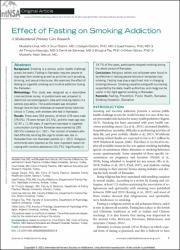| dc.contributor.author | Ünal, Mustafa | |
| dc.contributor.author | Öztürk, Onur | |
| dc.contributor.author | Öztürk, Gülşah | |
| dc.contributor.author | Fidancı, İzzet | |
| dc.contributor.author | Atayoğlu, Ali Timuçin | |
| dc.contributor.author | Sönmez, Cemil Işık | |
| dc.contributor.author | Taş, Ertuğrul | |
| dc.contributor.author | Gürsu, Orhan | |
| dc.contributor.author | Selçuk, Mustafa Yasin | |
| dc.date.accessioned | 2022-01-04T08:10:01Z | |
| dc.date.available | 2022-01-04T08:10:01Z | |
| dc.date.issued | 2021 | en_US |
| dc.identifier.citation | Ünal, M., Öztürk, O., Öztürk, G., Fidancı, İ., Atayoğlu, A. T., Sönmez, C. I. ... Selçuk, M. Y. (2021). Effect of fasting on smoking addiction: A multicentered primary care research. Journal of Addictions Nursing. https://dx.doi.org/10.1097/JAN.0000000000000414 | en_US |
| dc.identifier.issn | 1088-4602 | |
| dc.identifier.issn | 1548-7148 | |
| dc.identifier.uri | https://dx.doi.org/10.1097/JAN.0000000000000414 | |
| dc.identifier.uri | https://hdl.handle.net/20.500.12511/8755 | |
| dc.description.abstract | Background: Smoking is a serious public health challenge across the world. Fasting in Ramadan requires people to stay away from smoking as well as activities such as eating, drinking, and sexual intercourse. We examined the effect of fasting on cigarette smoking and nicotine addiction during the Ramadan. Methodology: This study was designed as a descriptive cross-sectional survey. A questionnaire was prepared to determine sociodemographic data and smoking habits of a sample population. The questionnaire was delivered through face-to-face interviews at several family medicine clinics in Turkey, with smokers who fast in Ramadan. Results: There were 354 persons, of which 278 were male (78.5%), 76 were female (21.5%), and the mean age was 32.92 ± 11.84 years. A significant decrease in cigarette consumption during the Ramadan was reported by 285 (80.5%) smokers (p < .001). The number of smokers who had difficulty resisting the urge to smoke was less in Ramadan than non-Ramadan periods (p < .001). Religious sentiments were reported as the most important reason for coping with nicotine abstinence (53.7%). Significantly in 14.7% of the cases, participants stopped smoking during the whole period of Ramadan. Conclusions: Religious beliefs and willpower were found to be effective in helping people reduce or temporary stop smoking. Fasting may play a significant role in changing smoking behavior. Smoking cessation along with counseling supported by the state, health authorities, and clergy can be useful in the fight against smoking in Ramadan. | en_US |
| dc.language.iso | eng | en_US |
| dc.publisher | Mary Ann Liebert, Inc. | en_US |
| dc.rights | info:eu-repo/semantics/embargoedAccess | en_US |
| dc.subject | Fasting | en_US |
| dc.subject | Prevention | en_US |
| dc.subject | Public Health | en_US |
| dc.subject | Ramadan | en_US |
| dc.subject | Smoking Cessation | en_US |
| dc.subject | Starvation | en_US |
| dc.title | Effect of fasting on smoking addiction: A multicentered primary care research | en_US |
| dc.type | article | en_US |
| dc.relation.ispartof | Journal of Addictions Nursing | en_US |
| dc.department | İstanbul Medipol Üniversitesi, Tıp Fakültesi, Dahili Tıp Bilimleri Bölümü, Aile Hekimliği Ana Bilim Dalı | en_US |
| dc.authorid | 0000-0003-4568-4234 | en_US |
| dc.relation.publicationcategory | Makale - Uluslararası Hakemli Dergi - Kurum Öğretim Elemanı | en_US |
| dc.identifier.doi | 10.1097/JAN.0000000000000414 | en_US |


















